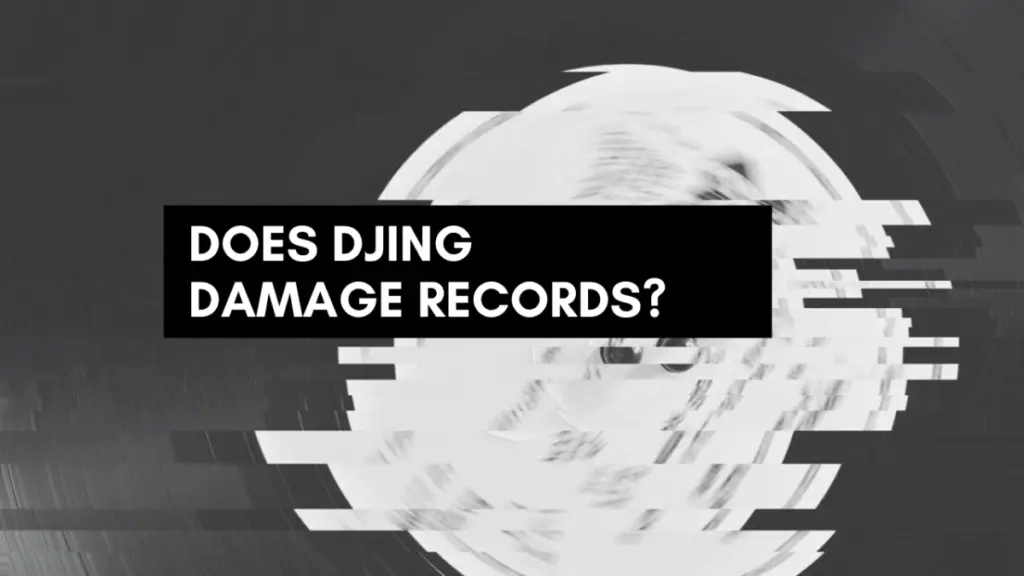
If you want to use vinyl while DJing, that can be a great way to share your favorite music with others. Since DJing allows you to mix the music, you can make some old classics into something new. In any case, it can be helpful to know how to maintain your vinyl so that you can keep listening and mixing your favorite songs.
Does DJing damage records? The more a record is played, the more it will wear down. So yes, DJing can damage records, specifically the sound quality, over a long period. However, using the right tools and accessories can help prolong its lifespan.
If you’re a DJ and want to work with vinyl, you will have to be more careful than if you play music through a computer. Working with physical records will almost always have the potential for damage, whereas you can play a digital recording as much as you want without hurting it. The better you take care of your vinyl, the longer you can spin it.
How to Care for Vinyl
If you like to work with vinyl as a DJ, you have to know how to care for your records. That way, you can get the most out of them, and you won’t have to replace them so often. Caring for vinyl doesn’t have to be complicated, but it should become part of your routine.
While you don’t want to overclean your records, keeping them clean and protected is essential. Just as you should keep your records clean, you should also keep them out of harm’s way. Make sure you have a safe place to store your vinyl when not in use so that you can minimise the risk of damage that way.
For better or worse, vinyl is quite different from CDs and digital audio files. Of course, CDs need care, but you can replay digital files without the risk of losing sound quality. However, playing vinyl too much can affect how the recording sounds, which can have an impact on your experience and that of your listeners.
As you play and DJ with vinyl, consider how you touch your record and how you use it in your DJing. If you prioritise caring for your vinyl over making the most popular remix, you can save your record collection.
How Do I Avoid Damaging Records While Scratching?
It’s almost impossible to avoid damaging records while scratching. While you can minimise some of the damage with the right equipment, it will still happen. Records perform best when they’re left to rotate and play on their own.
However, you can avoid damage to the underside of the record by using a special mat. That will help protect it from the turntable itself, though the top of the record will still be subject to damage.
As you touch the record, the oils on your hands will transfer to the record. The oils from your skin can further degrade the sound quality of the record. So, make sure you wash your hands before DJing with a record to help reduce the risk of oils from your skin getting onto your vinyl.
Unfortunately, though, any amount of scratching will do some damage to the record. The damage may not be noticeable at first, but it will be there. Luckily, there are some tools that you can use that, while they won’t stop damage, they can minimise it.
Which Kind of Turntable is Best?
There are different kinds of turntables out there, but not all of them are suitable for DJing. The best type of turntable for DJing is a direct-drive turntable. They have a motor that spins the same speed, even when you reverse play a record.
As you reverse play, the turntable will use a higher torque, which can help the record and sound get back to normal more quickly. The higher torque the quicker the turntable returns to normal speed, meaning less accidental damage to the record. While you can use a belt-drive turntable, it takes more time to catch up to your speed. Plus, you’ll wear out the belt and need a new one.
You might also want to consider a turntable with pitch control. While this doesn’t affect how much your records are damaged, it can help you with beatmatching. It can be a nice feature to have so that you can transition from one song to the next more smoothly.
Are There Needles That Will Better Protect the Vinyl?
There are tons of needles available on the market, and a good needle can work better than a bad one. However, you can change the setting of your needle to help protect your vinyl. One of those settings is the weight of the tonearm.
The right setting for a tonearm can help since it can affect the weight placed on your record. A lighter weight setting will keep the needle from digging into your vinyl, which can reduce the damage from that. However, you should use a cartridge with a lower weight so that you won’t have any distortion that can come from using a heavier cartridge but on a lighter setting.
You can also enable anti-skating control, which will keep the tonearm from moving in and out with the record. This can help reduce the damage from the needle, but even the best needle won’t protect your vinyl from scratching.
Use a Special Cleaner
If you notice that your records are making a lot of pops, or the sound quality is worsening, you may feel the need to clean your vinyl. Keeping your records clean can help them last longer. However, you can’t use just any household cleaner since some of them have harsh chemicals that can do more harm than good.
- Instead, use a specialised solution to clean your records. You can use a basic solution, or you can use a professional-strength option if you need a better clean.
- These solutions are safe for your vinyl, but they’ll still clean off any dust or particles without scratching or destroying your records.
- Similarly, you shouldn’t use any old cloth you have to wipe down your vinyl. Instead, choose an anti-static record brush to clean the record.
If you want to take good care of your vinyl, make sure you have a special cleaner and brush on hand. That way, you can clean your records at a moment’s notice, but you won’t have to settle for household supplies. Once you use a special cleaner, you won’t want to go back to the other stuff. Here’s an example of a product that can help you.
Hold the Outer Edges
Since it can be all too easy to scratch or leave oil from your skin on vinyl, you may wonder how to handle your records. The good news is that you don’t have to wear gloves or anything special when moving your vinyl. You just have to stick to touching the outer edges.
- The outer edge doesn’t interact with the needle of a turntable, so music isn’t “stored” there. That means touching it shouldn’t result in damage.
- As you put a record on the turntable or take it off, make sure you only touch the outer edge of the vinyl so that you don’t scratch it.
- This is another reason why you should wait for a record to stop moving before you touch it. That way, you can more easily grab it by the edges.
While it can be tempting to grab a record wherever sticking to the edges is much safer. It will force you to be more careful as you move the vinyl, and it will reduce your risk of accidentally damaging it. However, you have to be careful when putting the record away.
Carefully Place the Record in Its Cover and Sleeve
After you finish playing a record, make sure you put it away. If you leave vinyl lying around, it can collect dust and dirt. Let that go unnoticed, and that could damage the record or at least the sound quality. Still, you shouldn’t just drop them into their sleeves.
Instead, open the sleeve and hold it sideways. Then, grab your record by the edge and slide it in slowly. That way, the vinyl won’t get knocked around, and you can ensure that it won’t sit out collecting dust.
Once you put your records in their sleeves, store them out of direct sunlight and avoid stacking them. The more weight a record has on top, the more likely it is to warp and not work correctly. So stand them up and put them on a bookshelf or somewhere that will keep them from sliding around.
Final Thoughts
While DJing can wear down your records, so can playing them in any other capacity. The key is knowing how to protect your vinyl so that you don’t cause excessive damage. That way, you’ll be able to enjoy your favourite records for years to come.
